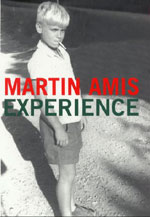Mart's Smart
| |

| Much as I suspect Tangents is here primarily to honour the obscure three-album genius who dies in poverty or lives on benefits (do they still have those?), I want to celebrate one of our best-known writers, a moderately best-selling, very rich (one infers) star of literary London, Martin Amis. The man who launched a thousand litpunks, sneering and scratching their spots at the world, first entered my consciousness, as so many good things did, in a second-hand bookshop. Success (1978), his third novel, impressed me at once with its binary-structured story of rich brother/poor brother and their opposed decline and rise. The quintessential early Amis moment, amid all the swearing and incest, is the anecdote about the blind girl first courted then mocked to her sightless face. In his best twists, Amis shows us just how mean our mean little hearts can be. This one led me to its predecessors, The Rachel Papers, his astonishingly precocious debut and Dead Babies. The latter's very title was too much in some quarters (it is also known as Dark Secrets, which makes it sound like a brand of chocolates). From murderous cabaret to mutilating anarchists to a full-blown horror-movie climax, Dead Babies really plays rough. Literature, I realized then, was allowed to be vicious. Who'd have guessed? It must be admitted that in the Amis record collection, Dead Babies is This Year's Model to an increasingly Juliet Letters output. As he has matured the savagery has given way to more complex modes. Other People is principally notable for the wonderful opening, in which a girl with total amnesia begins to reconstruct the world from the basics ("She found that heavy curved extensions had been attached to her feet. The idea was obviously to make walking very difficult"). Money is a big but not very likeable account of sex, cash and the film industry (Amis wrote the SF misfire Saturn 3). It's full of slightly iffy puns, but does have the virtue of including a comic character called Martin Amis. I remember the author and Mel Smith doing a segment from these scenes on BBC2 once, which was okay, but generally Amis doesn't film well (no, I haven't seen the-very belated-- movies of the first two novels. As with Wodehouse, you can film it how you will, but you still won't have the voice). |

| Einstein's Monsters, the first story collection, is probably the easiest book to criticise now, but in its time spoke powerfully for the anti-nuclear lobby. London Fields has a characteristic high-life/low-life contrast and turns on a controversial woman-as-willing- victim plot. Time's Arrow has the most ambitious formal structure, expounding the Holocaust as a ludicrous, incomprehensible sequence of events by finding other "explanations" in a narrative that literally runs backwards, from the protagonist's death to infancy. Questions of taste aside, it creates a bizarre sense of heightened satire, oddly reminiscent of Art Spiegelman's Maus; the enormity of the deeds involved being made newly fresh and horrific by the oblique treatment. The Information (1995), Amis' "midlife crisis" work, is a welcome return to a straightforward narrative, featuring literary rivals, the feebler of whom seems like a rewrite of Amis himself without the ept. Its sublime opening foreshadows its theme: Cities at night, I feel, contain men who cry in their sleep and then say Nothing. It's nothing. Just sad dreams. Or something like that...Women... will wake and turn to these men and ask, with female need-to-know, "What is it?" And the men say, "Nothing. No it isn't anything really. Just sad dreams." Night Train is, I think, the least successful novel, though again Amis experiments, by making his narrator an American woman. The metaphysical/cosmological elements of The Information here grow so weighty that they flatten the characters. Heavy Water, a compendium of stories, has some good moments. Better than these - and the volumes of accomplished essays and criticism, most recently The War Against Cliché - is the very fine memoir Experience (2000). For a fiction writer, and one often seen as an acerbic, mandarin figure, Amis produces a shockingly open and moving account of his life and relationships, especially with his father. He also discusses the murder of his cousin, his "lost" daughter and the much-ballyhooed business of getting his teeth fixed. All these are variously painful issues, handled with some delicacy. Experience is the final proof of the warm humanity behind Amis' cold, stellar sheen. © Mike Morris 2001 |